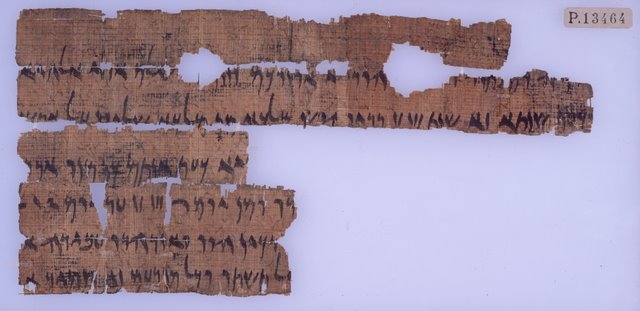| Source (Achaemenid Aramaic) | Source (Achaemenid Aramaic with Tiberian vocalization ) | Source (English translation) |
|---|---|---|
|
אל אחי ידניה וכנותה חילא יהודיא — אחוכם חנניה
|
אֶל אַחִי יְדַנְיָּה וּכְנָוָתֵהּ חֵילָא יְהוּדַיָּא — אַחוּכֵּם חֲנַנִיָּה׃
|
To my brother Yedaniah and his comrades, the Judean garrison — your brother Ḥananiah.
|
|
שלם אחי אלהיא ישאלו
|
שְׁלָם אַחִי אֱלָהַיָּא יִשְׁאָלוּ׃
|
May the God[s] request my brother’s welfare!
|
|
וכעת שנתא דא שנת חמש דריוהוש מלכא מן מלכא שליח על ארשם לאמר
|
וּכְעֶת שְׁנָתָא דָּא שְׁנַת חַמֵשׁ דָרְיָוֶהוּשׁ מַלְכָּא מִן מַלְכָּא שְׁלִיחַ עַל אַרְשָׁם לֵאמֹר׃
|
Now, this year, the fifth year of Darius, king of kings, word was sent to Arsames to pronounce:
|
|
בירח ניסן יהוי פסח לחילא יהודיא
|
בִּירַח נִיסַן יֶהֱוֵי פֶּסַח לְחֵילָא יְהוּדַיָּא׃
|
In the month of Nisan let there be a Passover for the Jewish garrison.
|
|
כעת אנתם כן מנו ארבעת עשר יומן לירח ניסן ופסחא עבדו מן־יום חמשא עשרא עד־יום עשרין וחד לניסן שבעת יומן זי פטירן
|
כְּעֶת אַנְתֵּם כֵּן מְנוּ אַרְבְּעַת עֲשַׂר יוֹמִן לִירַח נִיסַן וּפִסְחָא עִבִדוּ מִן־יוֹם חַמְשָׁא עַשְׂרָא עַד־יוֹם עֶשְׂרִין וְחַד לְנִיסָן שִׁבְעַת יוֹמִן זִי פַּטִּירִן׃
|
Now, you thus count fourteen days to the month of Nisan, and do a Passover from the fifteenth day to the twenty-first day of Nisan, seven days of flatbread.
|
|
אנתם דכין הוו ואזדהרו עבידה אל־תעבדו ביום חמשא עשרא וביום עשרין וחד
|
אַנְתֵּם דַּכְיָן הֲווּ וְאִזְדָּהֲרוּ עִבִידָה אַל־תַעְבְּדוּ בְּיוֹם חַמְשָׁא עַשְׂרָא וּבְיוֹם עֶשְׂרִין וְחַד׃
|
You must clean and take heed: do not do labor on the fifteenth and on the twenty-first.
|
|
אף שכר אל תשתו וכל מנדעם זי חמיר איתי בה אל־תאכלו מן יום ארבעא עשרא לניסן במערב שמשא עד יום עשרין וחד לניסן שבעת יומן
|
אַף שֵׁכָר אַל תִשְׁתּוּ וְכָל מִנְדַּעַם זִי חֲמִיר אִיתֵי בַהּ אַל־תֵאכְלוּ מִן יוֹם אַרְבְּעָא עַשְׂרָא לְנִיסָן בְמַעֲרַב שִׁמְשָׁא עַד יוֹם עֶשְׂרִין וְחַד לְנִיסָן שִׁבְעַת יוֹמִן׃
|
Any beer do not drink, and anything that has leaven within it do not eat, from the fourteenth day of Nisan when the sun sets in the west to the twenty-first day of Nisan, seven days.
|
|
אל יתחזי בכם אל תהנעלו בתוניכם וחתמו בין יומיא אלה
|
אַל יִתְּחֲזֵי בָּכֵם אַל תְהַנְעָלוּ בְּתַוְנֵיכֶם וּחְתִּמוּ בֵּין יוֹמַיָּא אֵלֶּה׃
|
Let it not be seen among you, do not bring it into your chambers, and seal it for these days.
|
|
כן יתעבד כזי אמר דריוהוש מלכא
|
כֵּן יִתְעֲבֵד כְּזֵי אֲמַר דָרְיָוֶהוּשׁ מַלְכָּא׃
|
Thus do, according to the pronouncement of Darius the king.
|
|
אל אחי ידניה וכנותה חילא יהודיא — אחוכם חנניה
|
אֶל אַחִי יְדַנְיָּה וּכְנָוָתֵהּ חֵילָא יְהוּדַיָּא — אַחוּכֵּם חֲנַנִיָּה׃
|
To my brother Yedaniah and his comrades, the Judean garrison — your brother Ḥananiah.
|
Source(s)

